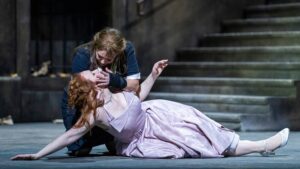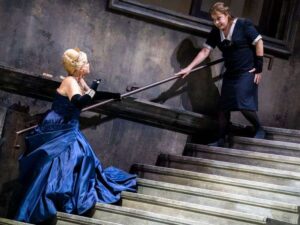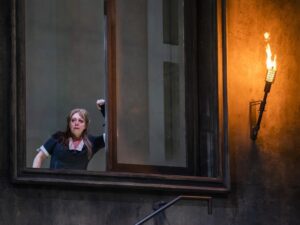Soon – if I don’t run out of steam – we will celebrate together the tenth anniversary of this website, and with this small jubilee various other anniversaries, both sad and happy. However, let me once again put my nose out of our backyard and point out that various eras are coming to an end across the operatic world: entire generations of musicians associated with a particular performance practice are passing away, the splendour of companies that were supposed to last forever is fading, great projects initiated years ago are coming to a close. What is also coming to an end is Antonio Pappano’s musical reign at the Royal Opera House. The conductor, in the prime of his life and at the height of his creative powers, is leaving the legendary Bow Street building after twenty-two years to take the helm of the London Symphony Orchestra in September. In January Pappano bid a symbolic farewell to the ROH audience, choosing for his final premiere a work by the same composer and prepared with the same director with whom he triumphed in 2002, when he opened his first London season as Covent Garden’s Music Director. From Ariadne auf Naxos to Elektra. From a magnificent, colourful staging of an opera the creators of which deliberately juxtaposed the world of Greek myth with Wagner’s ideal of boundless love, to a dark study of revenge derived from Sophocles’ tragedy. A brilliant closure of the collaboration with the German freelancer Christof Loy, with whom Pappano has come a long way – from the youngest-ever boss of the ROH to the acclaimed architect of the London company’s undisputed greatness.
This time I went to London in a semi-official capacity, making it a social occasion as well, and after the performance I was able to share my impressions about the musical and theatrical side of the farewell event as much as I wanted. I knew Ariadne – revived at the ROH four times, last time in 2015 – only from video recordings, but I always thought it was an outstanding production. I was surprised, like Pappano, that for so many years he had not decided to have his “own” Elektra, even though during his reign Strauss’ one-act opera had appeared on the London stage several times under different conductors and in staging by other directors. I expected from the very beginning that the production would attract extraordinary attention of both critics and music lovers. I decided to come to see the third of the six scheduled performances – after the general slackening and decline of form that usually accompanies the so-called second premiere, at a point when the singers are beginning to identify with their characters and the conductor is coming to a full understanding with the ensemble he is leading.
Nina Stemme (Elektra) and Sara Jakubiak (Chrysothemis). Photo: Tristram Kenton
However, I could not have predicted that Nina Stemme would withdraw already after the first performance to be replaced by the Lithuanian soprano Aušrinė Stundytė (in the end, the Swedish artist returned to the stage for the last two performances). The London audience, discouraged by the scathing reviews of Stemme’s performance at the premiere, was beside itself with joy. I was reserved, having seen Stundytė’s portrayal of Renata in Prokofiev’s Fiery Angel in Warsaw. It was nearly six years ago, the singer was just over forty, but already at that time her voice was tired, had too much vibrato and unattractive colour. Unfortunately, my fears were confirmed by the London Elektra, although I suspect that Stundytė’s intelligence and uncommon musicianship won the hearts of some English music lovers, who were charmed by her fragility and unexpectedly gentle take on the eponymous heroine of Strauss’ opera.
The problem is that this is probably not what Pappano and, especially, Loy had in mind. Loy this time created an unambiguously dirty staging, set in the static space of an unspecified bourgeois residence in Vienna during the Strauss-Hofmannsthal era. In this concept, Elektra – with her heart seething alternately with love, hatred and desire for revenge – does not wander around the palace in rags. Dressed in a modest black-and-white maid’s uniform, she coexists with the rest of the palace staff in the home of Klytaemnestra and her lover. She sneaks out into the coal-smeared courtyard with the Oversser and five Maids, for whom the ultimate freedom is to be able to crouch, even for a moment, on the steps of the staircase leading to the rear of the queen’s residence. We can only guess what happens inside the palace: the world lost by Elektra after Agamemnon’s death hides even deeper, behind one of the doors in the faintly yellowish-lit corridor. This space – positioned by the set designer Johannes Leiacker on a low mezzanine floor of the building surrounding the courtyard and perfectly lit by Olaf Winter – creates a striking impression of inaccessibility. Behind the high windows something is still going on, but in dead silence. The space of human relationships is suggested primarily by the costumes, especially of the three female protagonists: Elektra, relegated to the role of a servant; Chrysothemis, locked in a schoolgirl’s dream of normality (wearing a girlish, pale pink dress that looks as if it has aged with its owner); and Klytaemnestra, guilty of her two daughter’s misfortune (wearing sapphire silks and a white fur stole, the sumptuousness of which cannot hide the passage of years or the inner ugliness of the character).
Karita Mattila (Klytaemnestra) and Nina Stemme. Photo: Tristram Kenton
Such a staging – minimalist, far from being literal, operating primarily with symbols – has no room for a fragile Elektra and Stemme probably did not portrayed her as such. It is difficult for me to objectively assess Loy’s concept, because I suspect that the weakening of dramatic tension may have been caused by the sudden cast change, rather than any shortcomings on the director’s part. With Stundytė in the title role, Elektra came across as more delicate and in some ways less determined than Chrysothemis. The scene in which she recognised Orestes was indeed touching, but it didn’t touch the hearstrings the way it should have; even the eerie waltz in the finale, when Elektra can no longer hear anything but the music coming from within her, seemed strangely cautious and shaky.
Of course, I can’t put all the responsibility on Stundytė, who was brought to London at the last minute and had to add Loy’s instructions to her experience of recent productions by Warlikowski and Tcherniakov. There is this snag though – the Lithuanian soprano should not have taken on the role of Elektra in the first place. In no way does her voice resemble that of a “twenty-year-old Brünnhilde” demanded for the part: instead, she is a mature Tosca who has strayed into an unsuitable repertoire, being cast in Strauss and Wagner operas thanks to her musicality combined with fine stage presence and good acting skills. Stundytė’s soprano has a limited colour palette and lacks not only volume, but also the necessary intensity, traits that put Inge Borkh – whose voice was relatively small, but had exceptional dramatic potential – among the greatest Elektras of all time. Much better than Stundytė was Karita Mattila, a singer with great charisma, with which she skilfully masks the limitations of her inevitably aging soprano: although in the mezzo-soprano part of Klytaemnestra she had trouble projecting her voice in the upper and lower registers, she nevertheless managed to maintain her characteristic consistency and smoothness of sound across the scale. The thankless role of Aegisth was well sung by Charles Workman, whom I appreciate not only for the beauty of his voice, but also for his complete freedom and lightness of phrasing. Łukasz Goliński made a very successful ROH debut as Orestes. His is a resonant and deep baritone, golden in tone and wonderfully developed in the lower register. If he can be faulted for anything, it would a few intonational lapses, which can be put down to the earnestness of his interpretation. At least decent performances came from the rest of the numerous cast, led by the five Maidens (Noa Beinart, Veena Akama-Makia, Gabrielė Kupšytė, Ella Taylor and Valentina Puskás) and Lee Bisset in the small role of the Overseer.
Nina Stemme. Photo: Tristram Kenton
I left Chrysothemis for last, because it’s been a long time since I had to deal with a singer who would take control the entire stage from her first entrance on the word “Elektra!”. Sara Jakubiak was superior to Stundytė in every respect: her commitment to the character she created, the beauty of her voice, her phenomenal vocal technique and her extraordinary freedom in carrying out the tasks assigned to her by the director. I only hope – judging from the American singer’s career so far – that Jakubiak will not listen to the remarks of some reviewers who, having recovered from the initial shock, would like to cast her in the title role. God forbid: hers is a dark, powerful, but still lyrical soprano, crystal clear, floating over the orchestra like a voice from another world, impeccable in terms of production, the only one in the entire cast thanks to which the audience was able to marvel at the elegance of phrasing combined with a clear, deeply thought-out delivery of Hofmannsthal’s text. Had it not been for Jakubiak, I would sum up the vocal side of the London performance as generally decent, but unmemorable with few exceptions. Her portrayal of Chrysotemis was a memorable experience, somewhat unfairly overshadowing the other qualities of this altogether successful staging.
Pappano conducted the whole in line with Strauss’ own original instruction: “as if it were Mendelssohn”. He resisted the temptation to go for an extremely modernist reading of the score in terms of a persistent dramatic crescendo, an overwhelming cacophony of sounds, which many conductors further emphasise with a deliberately “dirty” sound of the various orchestral groups. Instead of the contrast between black and white, we got myriads of shades of love and hate, revenge and chaos, doubt and hope – and with them unexpected layers of lyricism, so often disregarded by contemporary conductors and so longingly remembered by admirers of Georg Solti’s legendary interpretation with Birgit Nilsson in the title role.
We didn’t get a new Nilsson, but no one dared doubt that Pappano was saying goodbye to the ROH in a style worthy of his greatest predecessors. Another circle is coming to a close. And I will soon share with you my impressions from La Monnaie, to whose glory Pappano contributed greatly before taking over the reins at the Royal Opera House; and from the English National Opera, which will soon disappear from London’s musical map. Let’s hope that this year I will witness the birth of new delights more often than bury irretrievably lost hopes.
Translated by: Anna Kijak



